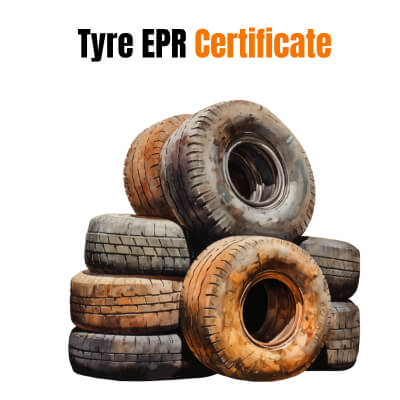
For businesses that produce, import, or sell tires, the Tyre Extended Producer Responsibility (EPR) certificate is a necessary certification. It guarantees that companies follow environmental laws pertaining to tire recycling and disposal. To expedite the process of obtaining this certificate, make sure to adhere to this detailed guide.
Under the context of Extended Producer Responsibility, a Tyre EPR certificate is granted. Manufacturers and importers of tires are required by this system to dispose of their end-of-life tires in an environmentally responsible manner. The certificate serves as evidence that a business has made the required efforts to abide by waste management laws and support sustainability.
Companies involved in any of the following activities need a Tyre EPR certificate:
The certificate helps in:
Before applying, familiarize yourself with the regulations governing tyre waste management in your region. Each country or state might have different requirements and processes.
Gather the following documents, as they are typically required for the application:
Your waste management plan should cover:
Ensure your plan meets the specific requirements set by the regulatory body.
Submit your application to the relevant regulatory authority responsible for issuing Tyre EPR certificates. This could be a national environmental agency or a local government department. Your application should include:
The authority will review your application after you submit it. While they evaluate your waste management plan and regulatory compliance, this procedure could take some time.
Start putting your waste management strategies into action while you wait for approval. This facilitates certification and demonstrates your dedication to EPR.
Following a successful review, your Tyre EPR certificate will be issued to you. With the help of this document, you can continue operating under the EPR framework and have your compliance confirmed.
Receiving the certificate is just the beginning. To maintain compliance, you must:
Challenge 1: Understanding Regulations
Solution: Seek guidance from environmental consultants or legal experts who specialize in EPR regulations.
Challenge 2: Developing a Comprehensive Plan
Solution: Work with waste management professionals to create a detailed and effective waste management plan.
Challenge 3: Meeting Deadlines
Solution: Start the application process early and set reminders for submission dates and renewal deadlines.
To find out more, please visit Metacorp
To apply online for tyre epr on the CPCB Portal, click HERE
Creating a solid waste management plan, gathering the required paperwork, and comprehending the requirements are all necessary to obtain a Tyre EPR certificate. Your accreditation can be successfully obtained and maintained if you adhere to these guidelines and continue to adopt environmentally friendly methods. This promotes your company as a conscientious and ecologically responsible enterprise while also aiding in regulatory compliance.





We are the pioneers in offering environmental consulting services to our patrons, giving us the first mover advantage & keeping us ahead of our competitors.
Very experienced in filing, monitoring & issuance of CDSCO Certificates, Drugs Licensing, Environmental Impact Assessment, AERB certificates, Pollution Control Board CTE & CTO, Waste Management Authorization from State Pollution Control Boards, Fertilizers & Insecticides Licensing
